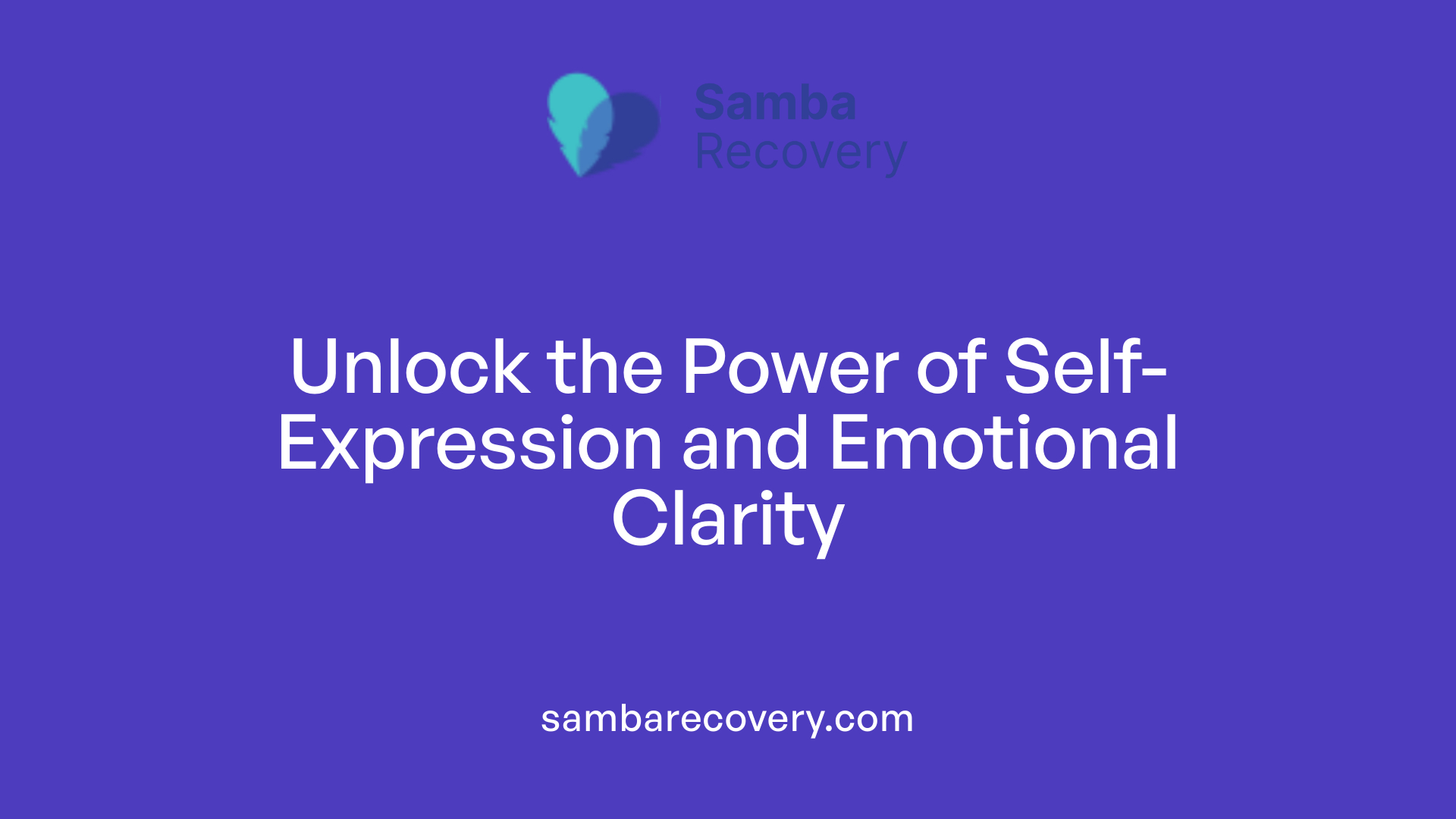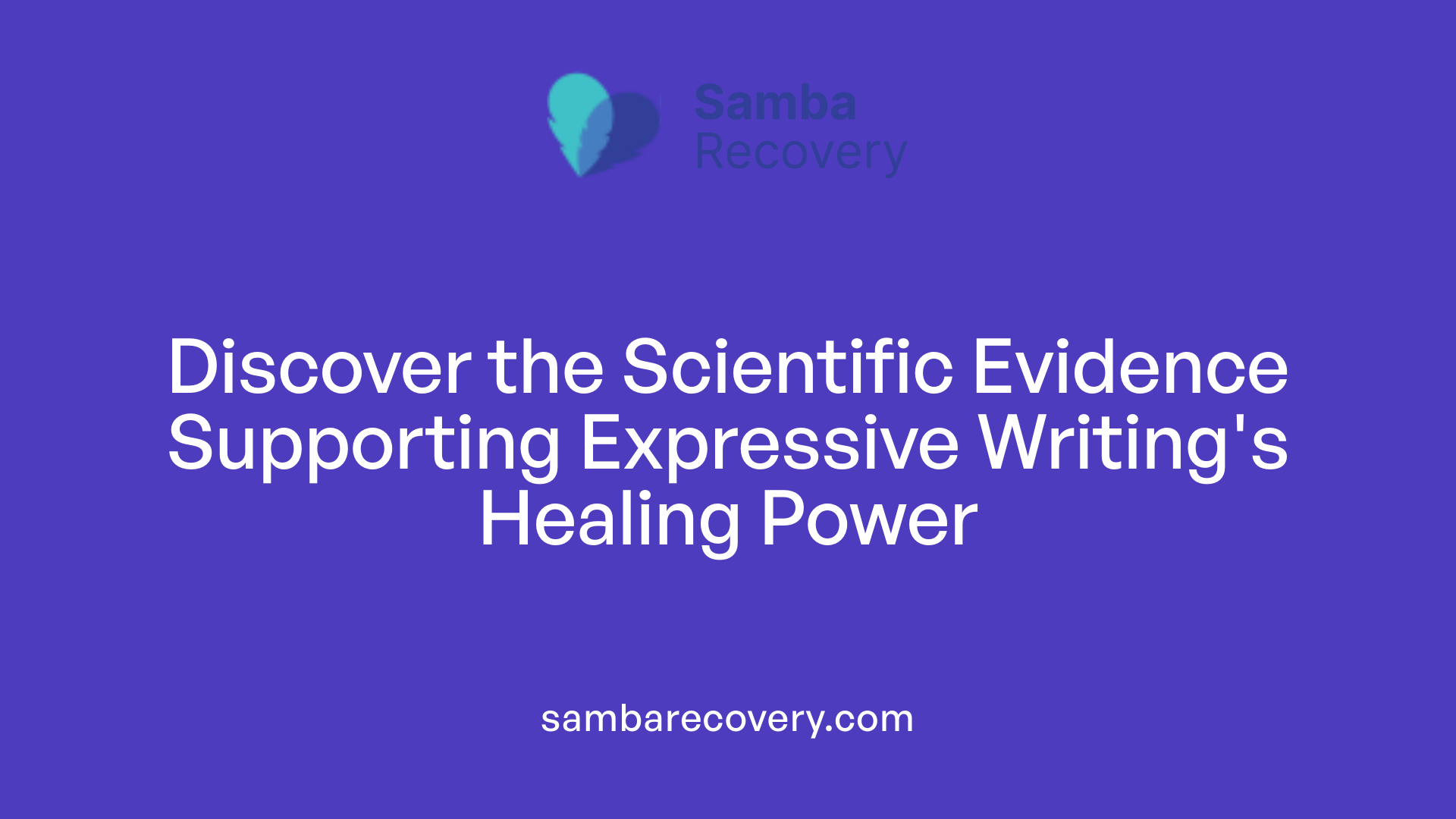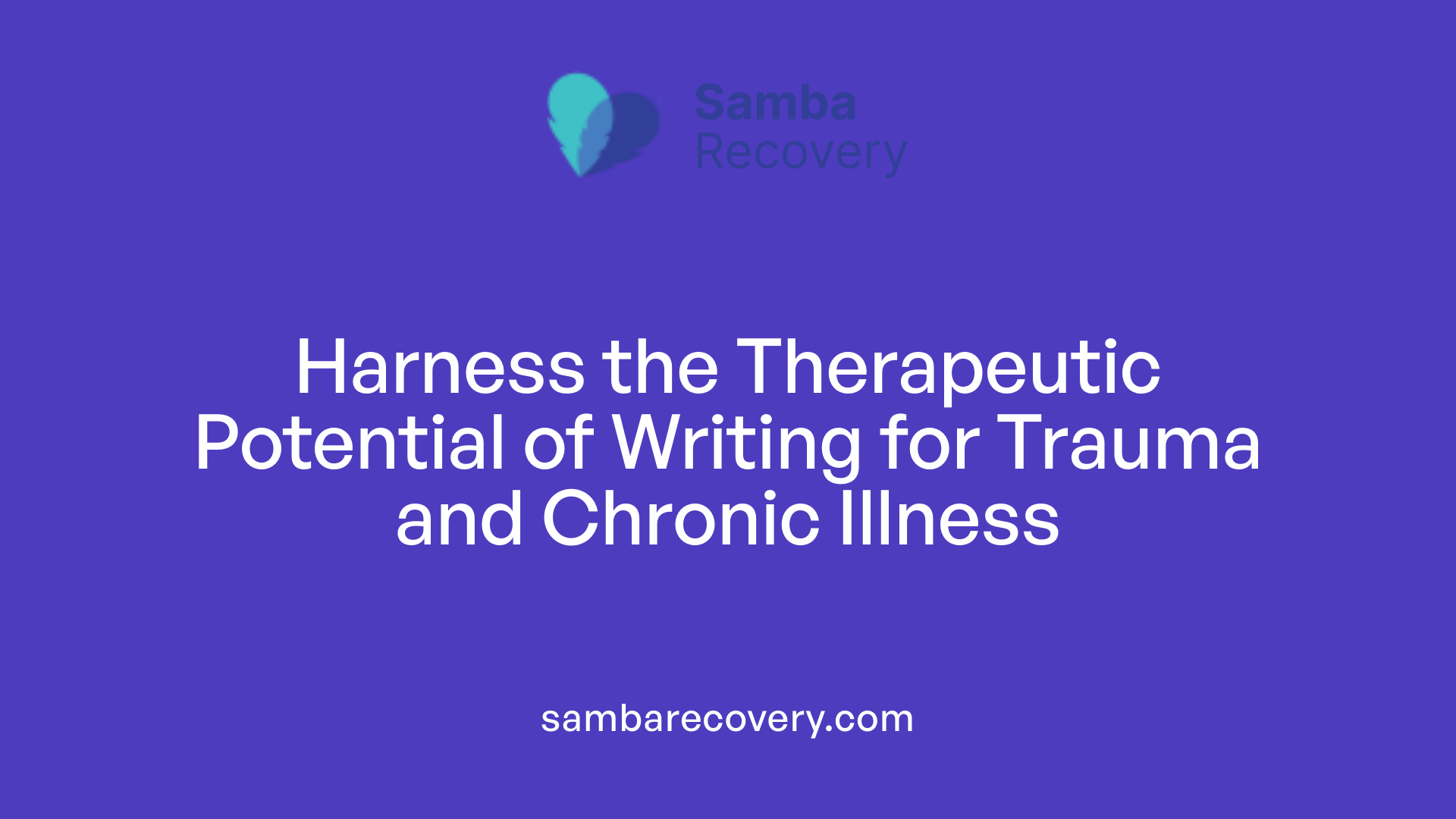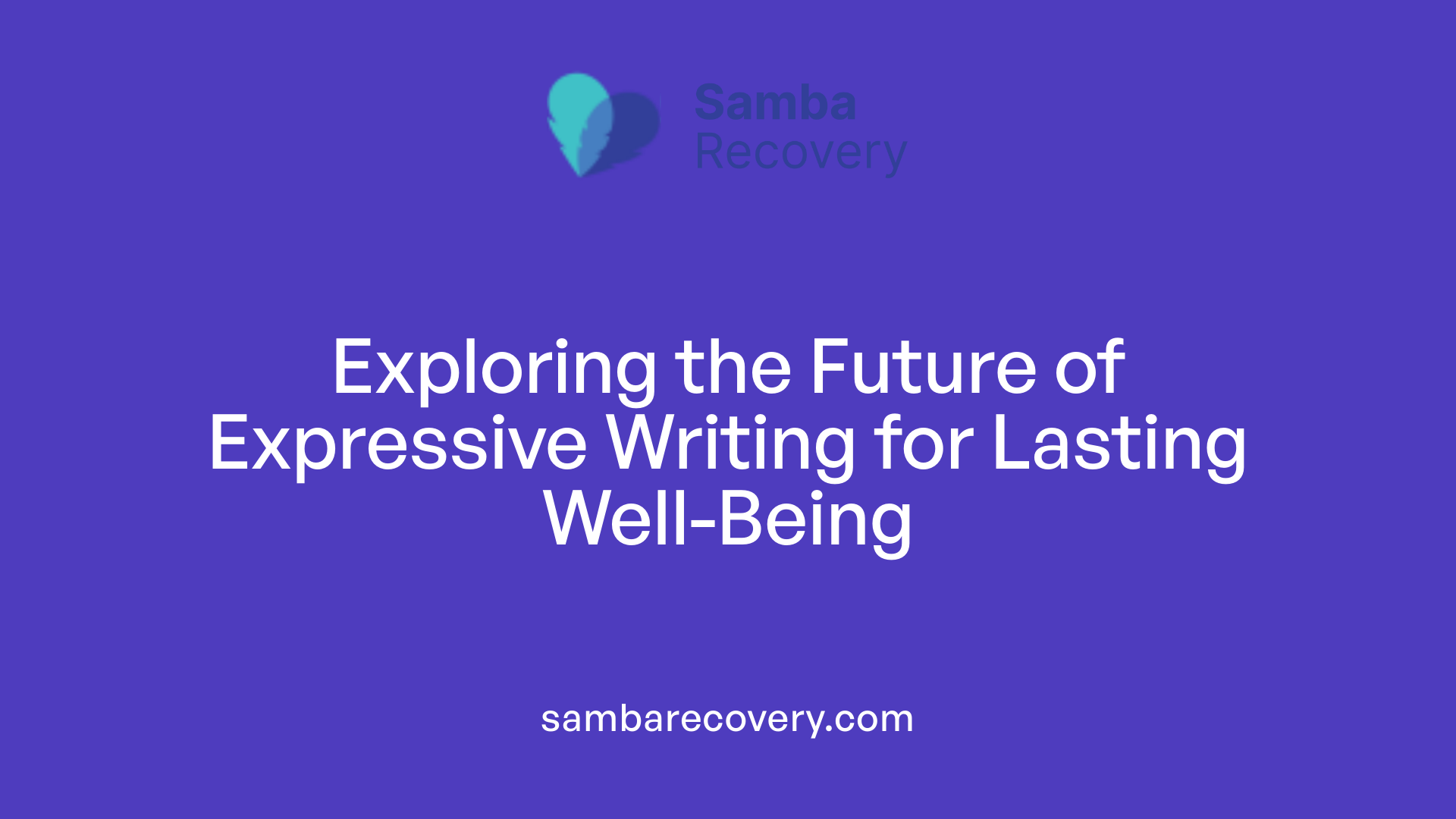Expressive writing as a recovery tool
August 1, 2025
Unlocking Healing Through the Power of Words

Introduction to Expressive Writing and Its Therapeutic Potential
Expressive writing is a simple yet powerful therapeutic tool that encourages individuals to explore and articulate their deepest thoughts and emotions related to emotional events. Rooted in psychological and neuroscientific research, this practice offers a non-invasive way to facilitate emotional and physical recovery by promoting self-awareness, emotional regulation, and resilience. Over the past 25 years, extensive studies have demonstrated its effectiveness in alleviating symptoms of trauma, depression, anxiety, and chronic physical health issues.
Understanding the Core of Expressive Writing

What is the aim of expressive writing?
The primary purpose of expressive writing is to facilitate emotional processing and self-awareness by encouraging honest reflection on personal thoughts, feelings, and experiences. This practice allows individuals to articulate their deepest emotions privately, creating a safe space to confront difficult issues. By doing so, expressive writing helps people understand and manage their emotions better, ultimately reducing stress and psychological distress.
Through consistent practice, individuals can organize complex feelings, gain insights into their reactions, and foster a sense of clarity about their emotional landscape. This process not only promotes mental health but also enhances decision-making and personal relationships, making it a valuable therapeutic tool. Overall, the goal is to improve emotional well-being by encouraging genuine self-expression and understanding.
What are the benefits of expressive writing?
Engaging in expressive writing can bring a range of positive effects across mental, physical, and relational domains. Regular sessions lasting about 15-20 minutes, typically over a span of several days, help individuals explore their innermost feelings related to stress, trauma, or major life changes.
Research shows that benefits include a reduction in anxiety and depression symptoms, improved immune system functioning, and lowered physical stress markers. Additionally, expressive writing can enhance emotional regulation, boost resilience, and foster healthier relationships through increased empathy and understanding. Guided practices using prompts—such as writing about gratitude, traumatic experiences, or future goals—further amplify these positive outcomes, supporting overall mental health and personal growth.
What are effective prompts or techniques for expressive writing?
Effective prompts encourage deep personal exploration by focusing on deeply personal events or emotions. Techniques such as emotion venting—freely expressing feelings—topic exploration—delving into specific memories or concerns—and setting time limits help structure the writing process.
Activities like trauma narratives, gratitude journals, or dream analysis deepen self-awareness and emotional understanding. Consistent writing routines, such as daily journaling or prompt-based exercises, create a habit that supports ongoing emotional processing.
Creating a secure, distraction-free environment and occasionally guiding writing with specific questions or themes enhances its effectiveness. Prompts that invite individuals to explore motivations, describe their feelings, or reflect on support systems facilitate deeper emotional insight.
How can expressive writing aid trauma healing and mental health recovery?
Expressive writing is well-supported by research as a means to process traumatic memories and facilitate emotional release. By articulating difficult experiences, individuals can reorganize and reframe their perceptions, leading to reduced emotional distress.
For example, studies by James Pennebaker show that writing about traumatic events over several sessions can lead to improved physical health, fewer doctor visits, and reductions in depressive symptoms. Incorporating mindfulness techniques alongside the writing process can increase present-moment awareness, reduce stress responses, and promote emotional stability.
This combination of expressive writing and mindfulness enhances resilience and accelerates recovery, making it especially effective for those dealing with trauma or severe emotional issues.
How does expressive writing support emotional and mental health?
At its core, expressive writing helps individuals confront and understand their emotions, preventing them from becoming internalized or suppressed. This emotional acknowledgment reduces the risk of chronic stress, anxiety, or depression.
Research indicates that although initial sessions may induce feelings of discomfort, the long-term effects include mood improvement, fewer health issues, and increased psychological resilience. When guided by therapeutic principles, expressive writing can improve communication skills, increase self-awareness, and support emotional regulation strategies.
Integrating mindfulness practices amplifies these benefits by fostering a calm, non-judgmental attitude toward emotional experiences, thereby promoting healthier coping mechanisms.
What are some specific effects of expressive writing?
Practicing expressive writing yields tangible outcomes such as decreased symptoms of anxiety and depression. It also enhances immune system functioning, leading to fewer illnesses and better overall physical health.
Participants often report improved cognitive clarity, better sleep quality, and increased emotional resilience. When used in relationship contexts, expressive writing fosters empathy and understanding, strengthening bonds.
Furthermore, it helps externalize internal struggles, allowing for a more objective view of personal challenges. Overall, consistent expressive writing supports emotional equilibrium, personal insight, and effective coping with stress and trauma.
| Aspect | Effect | Additional Details |
|---|---|---|
| Mental Health | Reduced anxiety, depression | Provides emotional release and insight |
| Physical Health | Improved immune response | Lowers stress hormones, enhances recovery |
| Emotional Resilience | Increased ability to handle stress | Reinforces positive coping strategies |
| Relationship Skills | Better empathy and understanding | Fosters positive communication |
Through these mechanisms, expressive writing serves as a powerful, accessible tool for promoting comprehensive well-being, healing, and personal development.
Scientific Foundations of Expressive Writing

Research by James Pennebaker and others
James Pennebaker, a renowned psychologist, pioneered extensive research demonstrating the healing benefits of expressive writing. Starting in the late 1980s, his studies revealed that writing about personal traumatic experiences for just 15 minutes daily over several days could significantly improve both physical and emotional health. His experiments with college students showed reductions in illnesses, fewer doctor visits, and enhancements in emotional well-being, establishing expressive writing as a powerful therapeutic tool.
Physiological and psychological benefits
Multiple studies over the past 25 years have documented the extensive health advantages of expressive writing. Participants often experience alleviated symptoms such as pain, fatigue, and stress-related health issues. Many report improvements in mood, sleep quality, and emotional resilience. For healthcare professionals exposed to high-stress environments, expressive writing can reduce burnout, assist with relationship development, and boost overall well-being.
Neuroplasticity and emotional regulation
Expressive writing facilitates neuroplastic changes in the brain, helping individuals reorganize traumatic memories and regulate emotions better. By translating emotional experiences into words, the brain pathways involved in trauma storage are altered, enabling emotional healing. This process supports mental health recovery by fostering resilience, improving emotional understanding, and promoting adaptive coping strategies.
Impact on immune function and stress reduction
Research indicates that expressive writing activates the body's relaxation response, lowering cortisol levels and reducing physiological stress markers. It has been linked to improved immune system functioning, fewer inflammation-related issues, and overall physical health enhancement. These effects contribute to a decrease in health care needs and promote faster recovery from illness.
| Aspect | Benefits | Supporting Evidence |
|---|---|---|
| Emotional health | Reduced depression, anxiety, and emotional distress | Pennebaker’s studies, broader clinical research |
| Physical health | Fewer doctor visits, lower inflammation, better immune response | Immune function studies, chronic illness outcomes |
| Brain and neural changes | Reorganized trauma memories, improved emotional regulation | Neuroplasticity research, trauma recovery studies |
| Stress management | Lower cortisol, relaxation activation | Physiological measures, stress reduction studies |
This body of evidence underscores that expressive writing is a scientifically supported intervention, capable of fostering emotional resilience, physical health, and overall well-being—transforming the way we approach healing from trauma, stress, and emotional distress.
Techniques and Practices in Expressive Writing

Session Length and Frequency
Effective expressive writing typically involves short, focused sessions lasting about 15 to 20 minutes. These sessions are ideally conducted daily or several times a week over a span of days or weeks. Consistency helps users process their emotions more thoroughly and build resilience over time. For example, writing daily for three to five consecutive days can significantly reduce stress and improve emotional health.
Prompt-Based Exercises
Using specific prompts can guide individuals through their emotional landscape. Common prompts include describing a traumatic or difficult event, expressing gratitude for positive aspects in life, writing a letter to oneself or to someone important, or exploring personal motivations. Prompts such as "Describe a moment when you felt truly supported" or "Write about what you wish others knew about your struggles" help focus the writing and deepen emotional processing.
Creating a Safe Environment
A crucial part of effective expressive writing is establishing a safe, private space. This involves choosing a quiet place where one can write without interruptions, ensuring confidentiality, and maintaining a non-judgmental attitude towards one's thoughts and feelings. Using calming routines like lighting a candle or playing soft music can enhance the feeling of safety. This environment encourages honest self-expression and reduces emotional overwhelm.
Incorporating Mindfulness and Self-Compassion
Integrating mindfulness techniques into writing sessions can enhance emotional regulation. Before starting, individuals might take deep breaths, practice grounding exercises, or set intentions for their writing. Practicing self-compassion during and after writing—such as gentle self-talk and acknowledging difficult feelings without criticism—helps prevent negative self-judgment. Combining mindfulness and self-compassion supports emotional resilience and deepens therapeutic benefits.
This combination of structured sessions, guided prompts, a secure setting, and compassionate awareness makes expressive writing a powerful tool for emotional healing and mental health improvement.
Practical Applications and Prompts for Recovery
Trauma narratives
Writing about traumatic or distressing experiences allows individuals to organize their memories, process difficult emotions, and reframe negative beliefs. Crafting detailed trauma narratives can help reduce symptoms of PTSD and foster emotional resilience. These narratives should be written in a safe and controlled environment, focusing on honesty and self-compassion. Repeatedly narrating traumatic events over multiple sessions can diminish their emotional impact and promote healing.
Gratitude journaling
Including gratitude journaling in expressive writing practices can shift focus from distress to positive aspects of life. Writing about things you are thankful for each day enhances mood, increases optimism, and balances emotional states. Practicing gratitude regularly can also bolster resilience and help individuals find meaning, even amidst challenging circumstances.
Letter writing and reflection exercises
Letters to oneself, loved ones, or even the traumatized part of oneself can serve as powerful tools for reflection. Unsent letters provide an outlet for expressing unspoken feelings and gaining clarity on personal needs and boundaries. Reflection exercises such as describing moments of strength or exploring sources of support can deepen self-awareness and empowerment.
Guided prompts for emotional exploration
Structured prompts help facilitate honest connections with one’s feelings. Examples include:
- Describe a recent situation that caused stress and how you responded.
- Write about a time you felt truly safe and supported.
- Explore your hopes and fears about the future.
- Reflect on what gives your life meaning.
Incorporating these prompts into regular writing routines can enhance emotional understanding, support mental health recovery, and build resilience. This diverse range of exercises, tailored to individual needs, provides practical pathways to process emotions, confront trauma, and foster well-being.
Role of Expressive Writing in Managing Trauma and Chronic Conditions

How does expressive writing help with chronic pain, depression, and anxiety?
Expressive writing is a powerful method for processing difficult emotions related to chronic health issues like pain, depression, and anxiety. By encouraging individuals to openly describe their feelings and thoughts about these conditions, it helps reorganize emotional experiences and reduce mental burdens. Research shows that regular expressive writing can alleviate physical symptoms such as pain and fatigue, while also decreasing feelings of depression and anxiety.
James Pennebaker’s studies highlight that writing about personal health hardships over a few days can lead to fewer health concerns and improved well-being. When people articulate their emotional struggles, they activate brain regions involved in self-reflection, which promotes emotional regulation and resilience.
How does expressive writing support addiction recovery?
For those recovering from addiction, expressive writing offers an outlet to explore unresolved trauma, shame, and emotional triggers. Journaling helps identify patterns of behavior, internalize insights, and celebrate progress.
Activities like trauma narrative writing or gratitude journaling reinforce a sense of agency and foster positive thinking. Mindfulness-based journaling, which involves being fully present while writing, can effectively manage cravings and prevent relapse by strengthening emotional awareness.
How can expressive writing help manage emotional triggers and shame?
Writing about emotional triggers, shame, or difficult memories facilitates their externalization and reduces their internal power. By confronting these feelings in a controlled, safe environment, individuals can diminish their intensity and gain insight.
Exercises like unsent letters or personal stories enable individuals to process shame without judgment, leading to increased emotional acceptance and self-compassion.
What role does expressive writing play in ongoing healing?
Expressive writing is not just a one-time activity but an ongoing practice that supports continuous healing. It fosters self-awareness, helps uncover hidden stressors, and strengthens emotional resilience.
Consistent practice can enhance mood stability, improve sleep, and deepen self-understanding. Integrating writing into daily routines or therapy enhances recovery outcomes and sustains emotional well-being over time.
| Application Area | Techniques | Benefits |
|---|---|---|
| Chronic illness | Journaling, trauma writing | Reduces symptoms, boosts immune response |
| Mental health | Narrative therapy, prompts | Improves mood, alleviates anxiety |
| Addiction | Gratitude journals, scripts | Clarifies triggers, fosters resilience |
| Trauma recovery | Unsent letters, storytelling | Externalizes pain, promotes healing |
Overall, expressive writing acts as a versatile tool in managing the emotional effects of trauma and chronic conditions, empowering individuals to achieve resilience and ongoing recovery.
Integrating Expressive Writing into Broader Therapeutic Practices
How can expressive writing complement traditional therapies?
Expressive writing can serve as a powerful addition to conventional mental health treatments like cognitive-behavioral therapy (CBT), art therapy, and trauma-focused approaches. It offers a safe, private space for individuals to explore and articulate their emotions, which may be difficult to express verbally. When combined with these therapies, expressive writing helps reinforce insights gained during sessions and provides additional opportunities for emotional processing.
Research indicates that expressive writing can deepen emotional understanding, bolster coping skills, and reduce symptoms of anxiety and depression. This makes it especially useful in trauma recovery, where reprocessing distressing memories through writing can help organize thoughts, lessen emotional burden, and foster a sense of control.
How does expressive writing improve emotional insight and resilience?
Engaging regularly in expressive writing promotes self-awareness by encouraging individuals to reflect honestly on their feelings, thoughts, and experiences. This process enhances emotional insight, helping people recognize triggers, understand their reactions, and develop healthier coping strategies.
Over time, consistent expressive writing can strengthen resilience—the ability to adapt and recover from stressful or traumatic events. Studies show that writing about personal hardships can lead to neuroplastic changes in the brain, supporting emotional flexibility and long-term psychological well-being.
Is there a difference between self-guided and therapist-led expressive writing?
Both self-guided and therapist-guided approaches have their benefits. Self-guided writing offers convenience and allows individuals to explore their feelings at their own pace, which can be especially helpful for those hesitant to seek direct therapy or dealing with less severe distress.
In contrast, therapist-led expressive writing involves structured prompts, guidance, and ongoing support. This approach is often more effective for individuals coping with complex trauma, severe depression, or anxiety, as a therapist can help process intense emotions, address resistance, and prevent potential re-traumatization.
Ultimately, choosing between self-guided or professional-led expressive writing depends on personal needs, comfort levels, and the complexity of emotional issues involved.
Overcoming Challenges in Expressive Writing Practice
How can emotional overwhelm and fear impact expressive writing?
Many individuals face feelings of emotional overwhelm and fear when starting expressive writing, especially if they delve into painful or traumatic memories. These intense emotions can evoke discomfort or even avoidance, making it hard to maintain regular practice.
To address this, it's helpful to set gentle, manageable goals. Starting with short sessions of 10-15 minutes and focusing on safe topics can build emotional resilience gradually. Remember, writing is a private process—your journal is a safe space where you can express anything without judgment.
What are common issues with time management and maintaining consistency?
Consistency is vital for experiencing the full benefits of expressive writing. However, busy schedules and lack of motivation can hinder regular practice. It's easy to skip sessions or delay starting altogether.
To overcome this, establish a routine by choosing a specific time of day for writing, such as morning or evening. Setting a reminder or linking writing to an existing habit, like after brushing your teeth, can reinforce the routine. Even brief, 10-minute sessions can be effective if done regularly.
How does censorship and self-judgment interfere with expressive writing?
Many people censor themselves or judge their thoughts as 'bad' or 'inappropriate,' which can stifle honest expression. Fear of being judged or making mistakes might prevent deep reflection.
The key is to write freely without concern for grammar, spelling, or taste. Allow yourself to vent, explore, and even write messy drafts. Remember, the goal isn't perfect writing but emotional honesty. Creating a non-judgmental environment—either by choosing private space or reassuring yourself—encourages openness.
What strategies can promote a sustainable and beneficial practice?
Sustainable expressive writing involves consistency, patience, and self-compassion. Incorporate variety by trying different approaches such as prompt-based exercises, poetry, or gratitude journaling. Use tools like timers to keep sessions focused and manageable.
It’s also helpful to reflect periodically on what you’ve written, acknowledging progress and insights gained. Sharing selectively with trusted friends or therapists can provide support and reinforce commitment. Most importantly, listen to your needs—if a session feels overwhelming, take a break and return when ready.
By addressing these challenges proactively, you can create a safe, sustainable expressive writing practice that fosters emotional healing, resilience, and personal growth.
Long-term Benefits and Future Directions in Expressive Writing

How does expressive writing contribute to sustained mental health improvements?
Engaging regularly in expressive writing can lead to enduring mental health benefits. Studies have shown that over weeks or months, individuals experience decreased symptoms of depression, anxiety, and stress. Writing about personal challenges, traumas, and emotional experiences helps organize thoughts, process unresolved feelings, and create meaning from difficult events, which ultimately stabilizes mood and enhances overall psychological well-being.
What role do neural and emotional resilience play in the benefits of expressive writing?
Expressive writing can induce neuroplastic changes in the brain, strengthening pathways involved in emotion regulation and self-awareness. When individuals articulate their feelings, they activate areas such as the prefrontal cortex, leading to better emotional control and resilience. Repeated sessions help reframe negative thought patterns, making individuals more adaptable and less reactive to stressors.
Are community and digital interventions making expressive writing more accessible?
Yes, digital platforms and community programs are expanding access to expressive writing practices. Online journaling apps, guided prompts, and virtual support groups enable more people to incorporate expressive writing into their lives conveniently. This democratization facilitates ongoing emotional processing, especially for those facing barriers to traditional therapy, and fosters a sense of community support.
What might future research explore in the field of expressive writing therapy?
Future research is poised to deepen understanding of how specific writing modalities influence brain plasticity, identify personalized approaches for different populations, and integrate expressive writing with emerging technologies like AI-driven prompts. Investigations may also focus on long-term neurobiological effects, optimal session frequency, and the development of tailored interventions for trauma, chronic illness, and mental health disorders.
| Aspect | Focus | Potential Outcomes |
|---|---|---|
| Neuroscientific research | Brain changes from expressive writing | Enhanced understanding of neural mechanisms |
| Personalized approaches | Customizing prompts and frequency | Increased effectiveness for diverse populations |
| Technological integration | AI, apps, virtual support | Broader accessibility and engagement |
| Long-term studies | Sustained effects over years | Data on lasting mental and physical health benefits |
As the field evolves, integrating scientific insights with innovative delivery methods will likely maximize the therapeutic potential of expressive writing, offering individuals new pathways to resilience and mental wellness.
Conclusion: The Transformative Power of Words
Expressive writing offers numerous benefits that can significantly impact mental and physical health. Research consistently shows that it reduces symptoms of anxiety, depression, and stress, while also boosting immune function, improving mood, and promoting emotional resilience. Through honest reflection and emotional release, individuals can process traumatic memories, gain clarity, and develop healthier coping strategies.
This form of writing empowers individuals in their healing journey. It fosters self-awareness, enhances emotional regulation, and helps uncover hidden stressors. For trauma survivors and those facing challenging emotions, expressive writing provides a safe space to articulate feelings that may be difficult to express verbally. This process can promote personal growth, rebuild self-esteem, and foster a sense of control over one’s emotional landscape.
Incorporating expressive writing into daily routines or therapy can be a practical and accessible way to support recovery. Whether through journaling, poetry, or guided prompts, writing helps externalize internal struggles, leading to greater understanding and acceptance. It encourages everyone—regardless of writing skill—to take an active role in their healing. Embracing this powerful tool can facilitate meaningful self-healing and provide a foundation for long-term emotional well-being.
Final Thoughts on Expressive Writing and Healing
As a simple, accessible, and effective tool, expressive writing empowers individuals to take an active role in their healing journey. Supported by robust scientific evidence, it facilitates emotional release, cognitive restructuring, and resilience building. Whether used independently or as part of a broader therapeutic plan, expressive writing offers a pathway toward greater emotional well-being and physical health. Encouraging regular practice can help transform trauma and stress into opportunities for growth, hope, and self-discovery.
References
- Expressive writing. A tool to help health workers. Research project ...
- Writing Can Help Us Heal from Trauma - Harvard Business Review
- Expressive Writing Therapy: A Simple Tool for Emotional Healing
- Journaling and Expressive Writing in Recovery
- Expressive Writing Therapy For Emotional Healing
- Writing Therapy and Why It Works - Atmosphere Press
- Expressive writing therapy: Definition, Benefits, and Techniques
- Expressive Writing - A Proven Tool For Chronic Pain Relief
About Samba Recovery
Start your treatment today!

Featured Articles
Read the latest addiction news and recovery tips from our blog.
Samba Recovery never miss an opportunity
Substance use may be part of your story, but it doesn’t have to be the rest of it. Sustainable recovery is possible and the best version of yourself is waiting at our Atlanta and Savannah, Georgia addiction recovery centers.
We’ll help you learn that the opposite of addiction is connection. We’ll give you skills to discover your self-worth and show you the tools for a life of hope and promise.
Contact us today!
We accept most major insurances
We partner with most major insurances, enabling you to access premier therapy services.










































































































